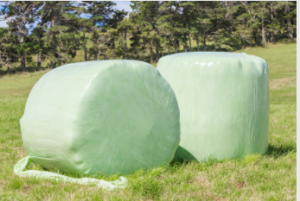A common but often overlooked aspect of agricultural marketing today is using hay as a valuable agricultural product. The use of polyethylene or “PVC” to construct these wrapping systems allows farmers to effectively protect their most valuable crop while also ensuring the protection of the environment and keeping weed growth to a minimum. The primary reason for the product’s popularity lies in its ability to provide weed control while also allowing moisture to penetrate the soil to deliver healthy crops to market. There are many environmental and economic benefits to protecting the environment through the use of weed control.
In addition to its value to farmers forage production, the application of Silage-Wrap for silage wrap has proven beneficial to public relations efforts. For many, the visual appeal of PVC can influence purchasing decisions and community awareness efforts such as tree planting programs. Additionally, due to the PVC material it is constructed from, the wrapping system lends itself to recycling and composting. It means farmers have an additional opportunity to make a positive impact on the environment.
A silage wrap system can reduce weed pressure and improve moisture permeability to promote healthy root growth. A weed barrier is necessary when farmers forage for heavy cover crops such as cotton. However, with the tight spaces and limited access to roads in traditional forage-growing regions, farmers may need to seek other means to ensure a consistent flow of supplies. Baled silage provides a cost-effective solution to streamline the delivery of supplies to the field. The addition of a silage wrapper also ensures that baled silage remains consistent in colour and texture throughout the growing season.
 Another benefit to bale construction comes from its ability to insulate the underlying soil. Insulation creates a safer working environment for all parties, as it decreases the amount of moisture loss from the soil and increases its resilience to temperature fluctuations. An excellent insulator of heat and cool, a silage wrapping will keep your most expensive machinery from overheating or chill air from inside the warehouse to the point where it breaks down. The added insulation also reduces the noise generated by machinery during processing, thereby improving production efficiency.
Another benefit to bale construction comes from its ability to insulate the underlying soil. Insulation creates a safer working environment for all parties, as it decreases the amount of moisture loss from the soil and increases its resilience to temperature fluctuations. An excellent insulator of heat and cool, a silage wrapping will keep your most expensive machinery from overheating or chill air from inside the warehouse to the point where it breaks down. The added insulation also reduces the noise generated by machinery during processing, thereby improving production efficiency.
A third benefit is found with the use of bale or sheeting feed bags. Feed bags offer great convenience to the storage and transportation of produce during harvest season. A silage warehouse should have the option of using a combination of sheeting and bales to create an efficient system that ensures all produce is made accessible and at the right temperature for shipping to customers. In addition, feed bags are an environmentally responsible choice that will help reduce landfill waste, as they are reusable and biodegradable.
In addition to providing a much more streamlined storage and transportation system, bale and silage wraps are extremely easy to install. Silage sheeting can be installed on any smooth surfaced surface, including concrete, asphalt and wood. The installation process usually takes two or three days, and afterwards, the plant is ready to begin processing.
If you are looking for a cost-effective way to start a new silage wrap system, the best option may be a prefabricated bale system. Prefabricated systems allow for the quickest production and lowest capital outlay. The sheets are manufactured to exact specifications and then fitted together with the required silage wrap or sheeting. The manufacturer then pays for the land to be cleared and hauls debris away.
